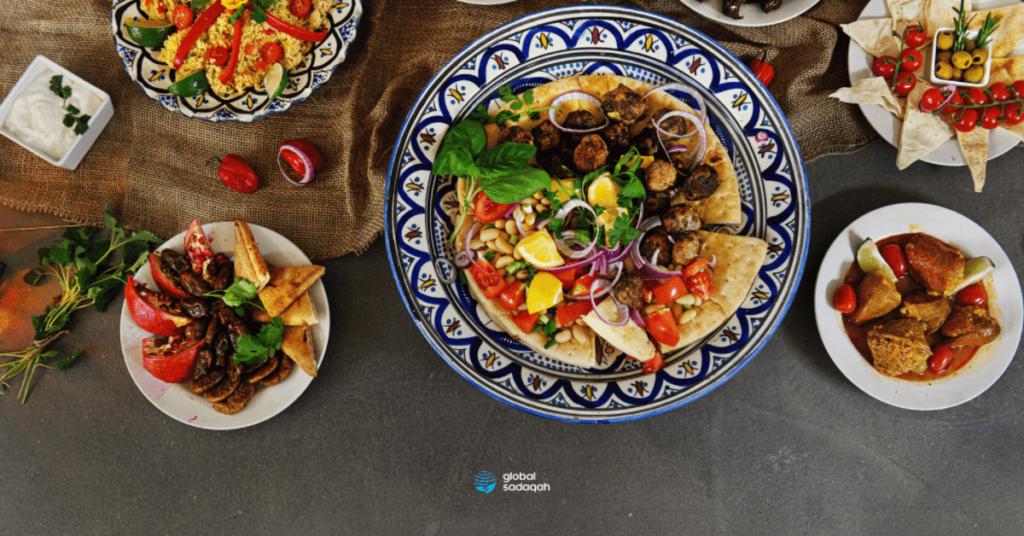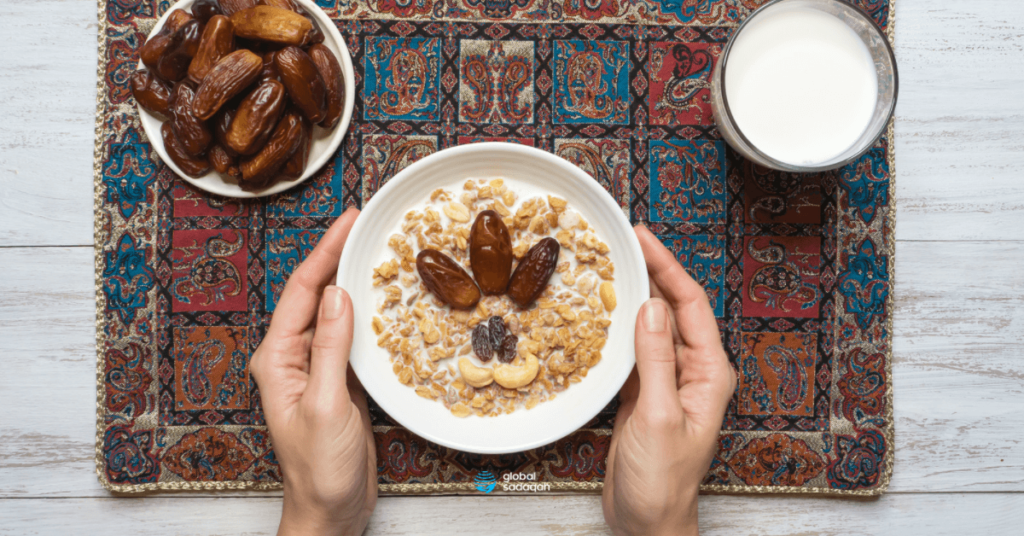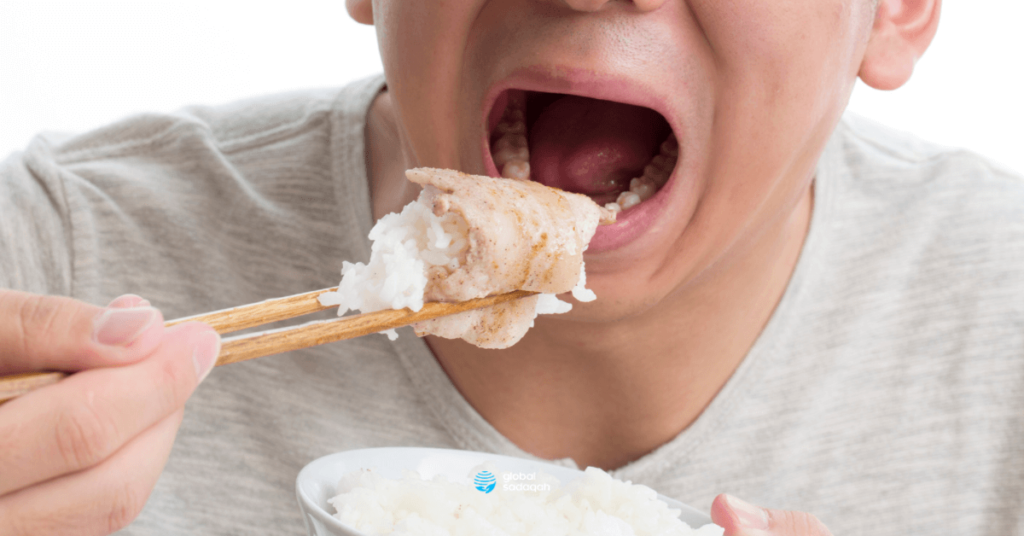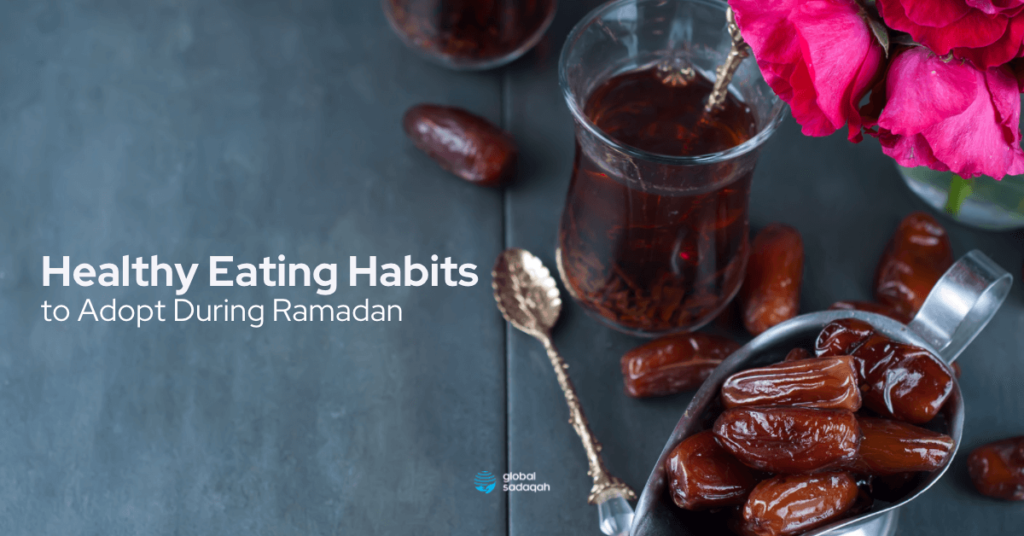Truth is that it can be tempting during the coronavirus crisis for people locked inside their homes to seek relief through eating (which led to overeating), and it may happen throughout the month of Ramadan at night. But from a positive angle, Ramadan is the perfect opportunity to practice healthy eating habits and reduce those sweet, yet awful cravings.
A lot of us tend to overeat once they break their fast as they devour sweet and delicious meals while lying on the sofa watching Netflix series at night. In anticipation of the long hours of fasting, some people may also tend to overeat during suhoor, which can heavily affect their weight (pun intended).
This is the month that teaches self-control, so restrain your bad eating habits and adopt a healthy eating routine. Moderation is the key to keeping you on course. Enjoy some of your favourite treats, but try to find healthy alternatives first.
Related: Physical Health Benefits of Fasting in Ramadan

Its easy to forget healthy eating habits during Ramadan when there are so many bazaars to choose from. But instead, for iftar, ensure you eat plenty of tasty salad greens and vegetables to go with your main meal. By ensuring at least half of your plate is full of healthy nutrients, you’ll get the energy and vitamins you need. Remember to eat your veggies first!
If Ramadan falls in the summer months, or if it is hot where you live, one of our best Ramadan tips is to stock up on fresh fruits such as watermelons. Not only is it great for rehydration, but it fills you up well, too! Do your best to avoid carbonated and fizzy drinks as these will dehydrate you very quickly and they don’t have any valuable nutrition.
Remember this too, avoid caffeine during suhoor. Caffeine makes you urinate frequently which means you dehydrate quicker. Instead, opt for a milkier drink if you need something warm, or go for water for something more refreshing and hydrating.
Related: 9 Tips to Prepare for Ramadan 2022

Another healthy eating habit during ramadan is to follow the tradition of starting your fast with dates and a glass of water or milk. Aside from the religious recommendations, there is also great reasoning behind this–dates contain many nutrients and health benefits including reducing blood pressure, reducing the risk of heart disease and colon cancer, and relieving constipation. Dates also fill you up pretty quickly and are a great source of slow-release energy–keeping you going for longer. Try breaking your fast with a handful of dates and a glass of milk before taking a break to perform salah. Most likely, you’ll find you won’t feel as hungry after you pray.
Due to the slow energy release in dates, it is a great idea to introduce this into your suhoor meal too. The ideal suhoor meal would consist of oats or porridge and some dates.
Making roast chicken and baked potatoes is a lot healthier than opting for fried samosas and chips – just think about how you will feel after all the grease! If you are a dessert lover, fresh fruit and ice-cream is a lighter alternative to chocolate or pastry desserts. Another useful tip for iftar is to keep some plain, natural yogurt on the table as it is great for aiding digestion.
1) Eat mindfully

You haven’t eaten all day and you may be tempted to eat as much as you can to make up for it. Before you do that, slow down and know that overeating will leave you feeling very unpleasant about an hour after your meal. Instead, try to eat your meal mindfully. By eating mindfully, you are paying attention to the full experience of eating your meal. You can do this by focusing on savouring each bite you take, rather than eating quickly without chewing properly.
How to eat mindfully?
- Taking smaller bites of food
- Putting your fork down between bites
- Paying attention to the taste, mouth feel, and smell of food as you are eating
The bonus of mindful eating is that it prevents overeating. You will find that as you eat your meal mindfully, you will be satisfied with a smaller amount of food.
2) Drink more water

As much as your body needs food for nourishment, it also needs water to stay hydrated. It is recommended to drink at least 8 glasses of water a day. During Ramadan, it can be challenging to drink enough water during non-fasting hours but it is doable. Start by replacing all of your sugary beverages with water.
Here are 3 ways to make drinking water easier and more enjoyable:
- Flavour your water naturally with lemon slices, berries, cucumbers, or mint
- After iftar, keep a water bottle with you so you can sip on water throughout the night
- Keep a pitcher of water at the table at suhoor and iftar so you are more likely to drink more than one glass of water
Once Ramadan is over, you can apply these tips daily to continue to increase your water intake.
Above are some tips for healthy eating habits to adopt during Ramadan. Feel free to try these tips for the upcoming Ramadan. In fact, we highly encourage you to get creative with the tips and turn them into your daily eating habits! Who knows, these habits might stick even after Ramadan is over?
Related : 5 Ways to Maintain Good Habits after Ramadan

